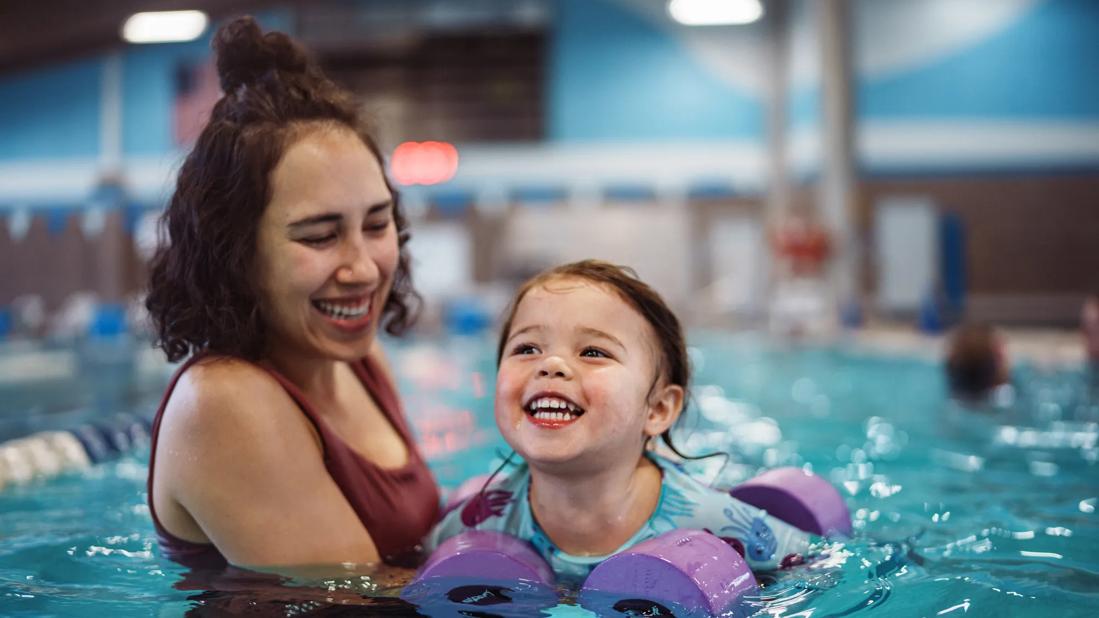Swimming is an essential life skill — kids should start learning to swim by age 4

Image content: This image is available to view online.
View image online (https://assets.clevelandclinic.org/transform/fbdc3979-c881-4791-a6d8-bc1647e818ab/swimming-lessons-2149854555)
Child in pool receiving a swimming lesson
Maybe you’ve seen those social media videos of people tossing tiny babies in a pool as part of their swim training. It looks thrilling and terrifying at the same time.
Advertisement
Cleveland Clinic is a non-profit academic medical center. Advertising on our site helps support our mission. We do not endorse non-Cleveland Clinic products or services. Policy
It’s enough to get you wondering — is that even safe? And when should kids learn how to swim? And is it too late for my tot?
We talked with pediatrician Richard So, MD (also a proud dad of an accomplished swimmer!), about when, how and why to teach kids to swim.
The American Academy of Pediatrics advises that most kids should start learning to swim by the time they’re 4 years old.
And earlier is better for some children, Dr. So says. Especially if:
Advertisement
The reality is that it’s never too early or too late to start developing some swimming skills and a sense of security in the water.
“There’s not necessarily a ‘best’ age that’s right for every kid to learn to swim,” Dr. So clarifies. “But it’s important for them to be comfortable in the water and know what to do to be safe.”
Some kids take to the water like little fish — no fear. Others need more encouragement. That’s OK.
If your little swimmer is anxious about getting in the water, you can start small, before you ever even sign them up for lessons.
Here’s what Dr. So recommends.
Bathtime can be a good time for your little one to splish, splash and get familiar with water.
“Often, kids’ biggest fear about swimming is just putting their head in the water,” Dr. So acknowledges. “You can help them get used to it in a controlled environment.”
Simulate an underwater experience by dripping water over their head, using a cup, a strainer or the shower head. Encourage them to blow bubbles as you pour.
When they’re comfortable with that, fill up the tub a little higher than usual (keeping a vigilant eye and a hands-on approach) and encourage them to blow bubbles in the water.
Little kids can also get used to wearing goggles in the tub (or in the shower for bigger kids). Let them wear the goggles while they clean up and encourage them to open their eyes as the water drips down their face.
Kids who are less familiar with the water should have a trusted adult within arm’s reach in the pool with them at all times. And even kids with some swimming skills should be monitored by a dedicated adult at all times. That’s important for safety and also helps kids to feel more comfortable and confident in the water.
Proper safety equipment matters, too. Kids should wear Coast Guard-approved life jackets to help keep them safe until they’ve proven to be capable swimmers.
Remember that sunscreen is an important part of outdoor safety as well. And choosing the right sunscreen can even help keep kids comfortable in the pool.
“Make sure that your sunscreen is water-resistant,” Dr. So advises. “That can help keep it out of kids’ eyes. That way, sunscreen irritation doesn’t become one more reason kids are hesitant about swimming.”
If your toddler or older child isn’t jazzed about swimming, see if you can partner up with a friend who is.
“When possible, see if you can sign up for swim lessons with a buddy,” Dr. So suggests. “They might feel more comfortable if they see their friend being brave.”
“Swimming is like riding a bike — it’s a life skill that everyone should learn,” Dr. So recommends.
Advertisement
Getting kids comfortable in the water is important for:
Is your little one ready to take the plunge?
Dr. So says that swim lessons are a good place to start. Look for lessons taught by certified instructors. Some swim schools may also offer teachers with specialized training for kids with autism and others who may benefit from additional support.
However and whenever you get your kids swimming, keep it safe and fun!
Advertisement

Sign up for our Health Essentials emails for expert guidance on nutrition, fitness, sleep, skin care and more.
Learn more about our editorial process.
Advertisement
Build breaks into training routines to prevent the wear and tear behind repetitive stress
Let your little one’s enthusiasm and motivation fuel their interest in running, but don’t pile on miles too early
Participating in sports teaches kids life skills and can build self-confidence for the long haul
Protective equipment like sports cups can help avoid injury
It depends on how sick they were
An annual exam looking at heart health
Follow guidelines to limit pitches, rest between games
The ideal post-tonsillectomy diet is about helping your child stay as comfortable as possible, but in general, there are no diet restrictions after surgery.
Prioritize your health by managing stress, strengthening your social connections and getting quality sleep
Bolsters, blankets, pillows and blocks can offer extra support, stability and comfort
Allergies, postnasal drip, asthma or reflux could be to blame for a cough that won’t quit